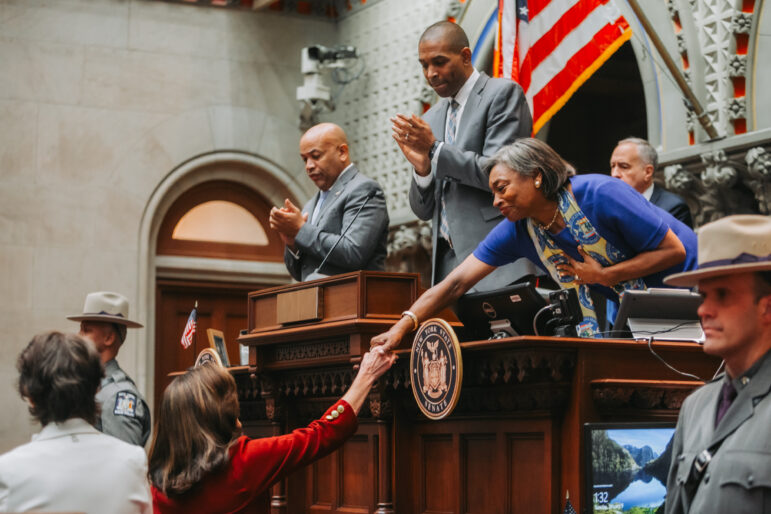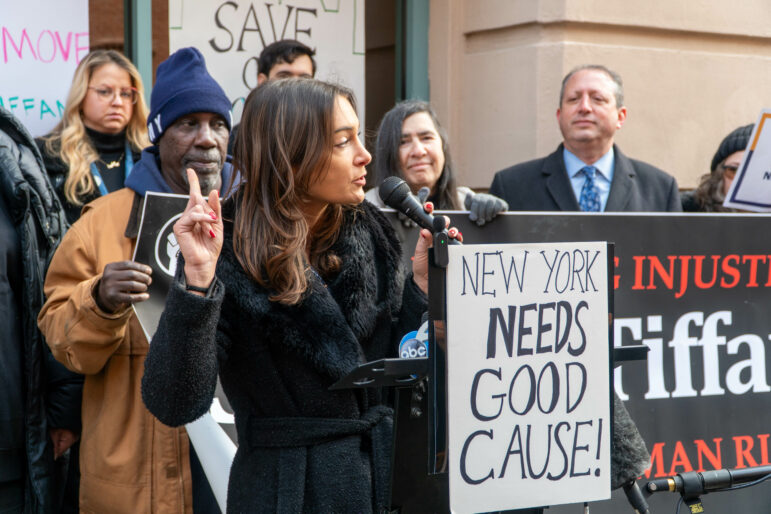With the state’s annual spending plan due in less than three weeks, the Senate and Assembly are calling for a housing plan that both incentivizes development and protects tenants from eviction.

NYS Senate Media Services
Majority Leader Andrea Stewart-Cousins greets Governor Kathy Hochul ahead of her State of the State address in January. Assembly Speaker Carl Heastie, far left, applauds.Second time’s the charm?
Last June, as the legislative session was coming to an end, Senate Majority Leader Andrea Stewart-Cousins and Assembly Speaker Carl Heastie released a laundry list of policies to expand the state’s housing supply and keep renters in place—endorsing them even as they kicked the can down the road.
“Unfortunately, it was clear that we could not come to an agreement with the governor on this plan,” the state legislative leaders wrote. Though details were thin, the list included a plan to boost affordable housing production, a statewide rental voucher program, a path to repair “dilapidated” apartments, and good cause eviction protections.
By this point, Gov. Kathy Hochul’s signature 2023 proposal to double New York’s housing supply over the coming decade under threat of local zoning overrides had fizzled.
Fast forward a year, and the governor has not tried to revive her “stick” approach to housing production, which hit a wall with legislators from New York City’s outer boroughs and the near-city suburbs. But Hochul’s priorities still veer from the Legislature’s, as demonstrated by the latters’ newly-released budget proposals.
With the state’s annual spending plan due in less than three weeks, the Senate and Assembly called this week for a housing deal that both incentivizes development and protects tenants. But Hochul, who has substantial leverage in budget negotiations, has insisted that these topics should be addressed separately.
“I’ve always talked about the need to protect our tenants,” Hochul told reporters in February. “However, they should not be conflated. I’m talking about supply. Regulations related to tenants do not get me more supply; they don’t build more housing in every corner of the state. So, they’re two different conversations.”
Good Cause clash
Hochul has yet to entertain Brooklyn Sen. Julia Salazar’s good cause legislation, a third-rail for the real estate industry that would give tenants across the state a defense against eviction so long as they keep up with their rent, as well as leverage to challenge steep rent increases. Landlords claim it would discourage development.
But the Senate said this week that it supports “advancing tenant protections that align with the core principles of Good Cause Eviction,” as a condition for other proposals, like a new tax incentive in New York City.
“The core principle of good cause is that people should not be evicted from their home for no good reason,” Senate Housing Committee Chair Brian Kavanagh told City Limits Tuesday.
And while the Assembly doesn’t reference the bill explicitly, a summary of its budget priorities states the body is “committed to addressing the state’s affordable housing shortage by enacting statewide policies that protect tenants from arbitrary and capricious rent increases and unreasonable evictions of paying tenants.”

Chris Janaro
State Sen. Julia Salazar at a rally outside 63 Tiffany Place in Brooklyn, calling for passage of good cause eviction legislation on Feb. 22, 2024.The Assembly went on to endorse “strong labor standards” in any housing deal, along with development incentives and funding for existing Mitchell-Lama programs: subsidized apartments and co-ops developed in New York City between 1955 and 1981.
Good cause is “just two words,” Assemblymember Linda Rosenthal, chair of her body’s housing committee, told City Limits Tuesday, arguing that the language “captures the essence” of the proposal.
Rosenthal went on to express optimism about the possibility of a broader deal, despite last year’s impasse. “I think the need is more urgent on all fronts,” she said. “I would not assume anything negative this year, because all sides want to accomplish something.”
Spending priorities
Other overlapping proposals from the Senate and Assembly include $250 million to launch the Housing Access Voucher Program, a statewide rental subsidy modeled after the federal Section 8 program, and $40 million for the Homeowner Protection Program, an anti-foreclosure project that tends to be left out of executive budget proposals.
The Senate also pitched $5 million for an Office of Civil Representation to expand tenants’ access to lawyers in eviction cases, while the Assembly proposed $10 million. Both bodies declined to endorse a path to legalization for basement and cellar apartments, a priority for New York City Mayor Eric Adams that Hochul backs.
The Senate and Assembly also put forward ideas for building housing on state-owned land. The former proposed $250 million for a New York Housing Opportunity Corporation, billed as Mitchell-Lama 2.0, while the Assembly pitched $500 million for Foundations for Futures, a limited-equity co-op plan it tried for last year.
Hochul’s plan includes $500 million for housing development on state-owned land, which she estimates could produce 15,000 housing units. “I’m obviously entertaining what they put forth,” she said Tuesday, of the Senate proposal. “My job is to assess and analyze this, and how this fits into the overall objective, which is to start building again.”
Unique to the Senate’s budget plan are amendments to the state’s social services law, expanding eligibility for emergency rent payments known as one-shot deals. The language increases the eligibility threshold from 125 percent to 200 percent of the federal poverty line and, significantly, removes a requirement to repay the grant.
The Senate also included $50 million to fund one-shots statewide. “We think that will dramatically decrease the rate of evictions across the state,” Kavanagh said. Deborah Berkman, supervising attorney of the Shelter Advocacy Initiative at New York Legal Assistance Group, called the proposal “huge.”
“In general, paying back one-shot deals is a crushing hurdle that people can’t get through,” she said.
Vacancy debate
Earlier this session, landlord trade organizations began pushing for various proposals to increase rents on regulated apartments—which benefit from annual lease renewals and limited rent adjustments—arguing that some share of empty units won’t be rentable without a boost.
But neither the Senate or the Assembly endorsed a bill to increase rents on vacant units following a tenancy of at least 10 years.
There were about 26,300 rent stabilized apartments both vacant and unavailable for rent in 2023, according to the latest Housing Vacancy Survey (HVS). Yet Rosenthal and Kavanagh both said Tuesday that a much smaller universe of apartments are both low-cost and in such poor shape that landlords cannot fix them without raising rents.
A new HVS analysis by Comptroller Brad Lander noted that north of 3,000 rent stabilized apartments were deemed dilapidated or uninhabitable in 2023. And at a recent City Council hearing, the New York City Department of Housing Preservation and Development estimated that about 1,730 apartments renting for $1,500 or less had been held off the market for a year or more.
In June 2019, New York passed the Housing Stability and Tenant Protection Act (HSTPA), multi-part legislation that eliminated most avenues for landlords of stabilized buildings to increase rents between tenancies.
“I worked very hard to negotiate the HSTPA in 2019 and I am not supportive of anything that’s going to undermine that work that we did,” Kavanagh told City Limits Tuesday.
But the Senate did signal that it is open to increasing the cost of renovations, known as Individual Apartment Improvements (IAIs), that can go toward a rent increase. The current cap is $15,000 over 15 years, and rents can increase 1/168th or 1/180th of the cost, depending on the building size.
“For starters there’s been some inflation since 2019, so certainly if you want to have something that’s functionally equivalent you’d raise [it] a little bit,” Kavanagh said. The Senate also proposed a $40 million fund to bring apartments in small stabilized buildings up to code.
Ellen Davidson, a staff attorney with the Legal Aid Society who lobbies for her organization’s priorities in Albany, said she was open to an adjustment for IAIs. “I do think that maybe it should have been tied to inflation,” she said.
But Jay Martin of the Community Housing Improvement Program, which has pushed for a rent reset following tenancies of at least a decade, dismissed the IAI language and repairs fund in a statement as “insufficient.”
Sherwin Belkin, a partner with Belkin Burden Goldman LLP who represents landlords, said increasing the IAI cap without allowing a larger share to go toward rent increases would be like “giving ice in the winter.”
Weeks ahead
Cea Weaver, campaign coordinator for the statewide tenant coalition Housing Justice for All, took a harder line on IAIs, pointing to the small number of low-cost apartments held offline for a year or more identified in the HVS.
“There’s no reason to change wholesale policy for hundreds of thousands of apartments for such a small problem,” she said.
Looking ahead, Weaver added, her coalition is focused on a housing deal that includes statewide good cause eviction protections. Allowing localities outside of New York City to opt into the program would not be acceptable, she said. Nor would a version of good cause with exclusions beyond owner-occupied buildings with less than four units.
The Senate budget proposal includes the words “good cause,” albeit linked to a New York City tax incentive. The Assembly proposal doesn’t use those exact words, but Weaver said she was heartened by their use of the word “statewide.”
“Given the pressure to make a New York City-only version of the policy, the word ‘statewide’ is pretty important,” she said.
To reach the reporter behind this story, contact Emma@citylimits.org. To reach the editor, contact Jeanmarie@citylimits.org








